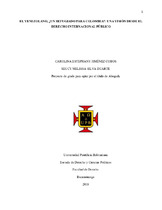| dc.contributor.advisor | Pimiento Osorio, Juan David | |
| dc.contributor.author | Jiménez Cobos, Carolina Estephany | |
| dc.contributor.author | Silva Duarte, Seucy Melissa | |
| dc.coverage.temporal | 2019 | |
| dc.date.accessioned | 2020-11-12T17:02:20Z | |
| dc.date.available | 2020-11-12T17:02:20Z | |
| dc.date.issued | 2019 | |
| dc.identifier.uri | http://hdl.handle.net/20.500.11912/6376 | |
| dc.description | 86 páginas | spa |
| dc.description.abstract | La ingente cantidad de migrantes venezolanos en todo el continente, producto de la crisis que vive el vecino país, ha significado una preocupación internacional sobre el destino de los mismos y especialmente, sobre el grado de realización de sus derechos subjetivos. Una de las soluciones planteadas para mitigar la vulneración de las prerrogativas humanas de estas personas es su reconocimiento como refugiados por parte de los estados a los que han llegado. En el caso colombiano, el gobierno ha emprendido diferentes actividades tendientes a brindar apoyo a los venezolanos en el territorio, no obstante, estas no giran en torno a la figura jurídica del refugio, por consiguiente, se pretendió mediante esta tesis desarrollar dicho fenómeno jurídico del Derecho Internacional, para determinar si en el contexto nacional es jurídicamente viable conceder el estatus de refugiado a los venezolanos que entraron al territorio, escapando de la crisis vivida en Venezuela. Para con ello determinar si es factible que estas personas sean reconocidas como refugiados y cuáles serían las consecuencias por ello. | spa |
| dc.description.abstract | The big number of Venezuelan migrants around the world, as a consequence of the crisis that happens inside the neighbor country, has created an international concern about the destiny of the people and specially, about the degree of achievement of their subjective rights. One of the solution established in order to relieve the breach of human prerogatives of the mentioned migrants is their recognition as refugees from the host countries. In the Colombian case, the government has launched several activities to promote support to the Venezuelans in the national territory. However, these activities are not about the legal figure of refugee, therefore we aim through this thesis to work on the mentioned legal figure of international law, to determine if within the national context is legally viable to grant the refugee status to the Venezuelans that enter the Colombian territory, in escape of the crisis that they lived in Venezuela. This product shows about the history content of migrations and legal conditions of refugee, highlighting its job In the Colombian legal system, in addition the crisis lived in Venezuela is observed, in order to determinate if it is feasible that these people are recognized as refugees and what would the consequences be for that status. | eng |
| dc.format.mimetype | application/pdf | |
| dc.language.iso | spa | |
| dc.publisher | Universidad Pontificia Bolivariana | spa |
| dc.rights | Attribution-NonCommercial-NoDerivatives 4.0 International | * |
| dc.rights.uri | http://creativecommons.org/licenses/by-nc-nd/4.0/ | * |
| dc.subject | Derecho internacional | spa |
| dc.subject | Venezolanos | spa |
| dc.subject | Refugiados | spa |
| dc.subject | Migración humana | spa |
| dc.title | El venezolano, ¿un refugiado para Colombia?: una visión desde el derecho internacional público | spa |
| dc.type | Trabajo de grado | spa |
| dc.publisher.department | Escuela de Derecho y Ciencias Políticas | spa |
| dc.publisher.program | Derecho | spa |
| dc.type.hasVersion | publishedVersion | spa |
| dc.description.sectional | Bucaramanga | spa |
| dc.description.degreename | Abogado | spa |


